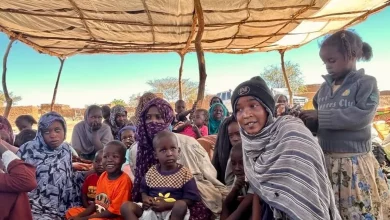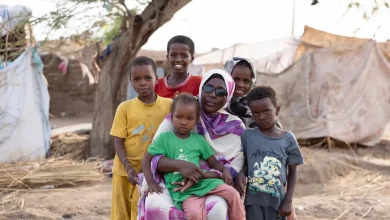Sudanese Women Overcome War Hardships Through Work and Innovation
Omdurman – Report by: Bakhita Zayed Al-Safi

The tragedies and repercussions of war have not stopped Sudanese women from resisting the outcomes of armed conflict and overcoming harsh conditions. Many have succeeded in creating a new reality through small-scale businesses that provide a decent income to support their daily lives, especially after losing their primary jobs. Some also had to cope with the arrest, displacement, or unemployment of husbands and sons.
In Omdurman — which has become a safe haven for many fleeing the conflict between the army and the Rapid Support Forces — and other parts of the capital, women have become active in local perfume trade, handicrafts, charcoal sales, and other ventures.
New Options
In this context, Awatif Al-Mahdi, a resident of Al-Jarafa, told Mashawir platform:
“Before the war, I worked as an employee in a government institution, but we hadn’t received our salaries for more than two years. As a result, my family, which consists of three children, suffered greatly, especially since I became their sole provider after my husband’s death.”
She added, “With no options left, I realized I had to come up with a way out of this crisis. After much thought, I decided to venture into the production of traditional Sudanese perfumes for women and sell them in nearby neighborhoods — and that’s how I started.”
Al-Mahdi explained that “within a short period, the perfumes gained popularity, especially among local women and those preparing to travel abroad.”
She pointed out that “this type of business was never part of my career plans, but the harsh conditions brought on by the war pushed me to pursue it, even though I previously held a government position and am raising children alone.”
A Major Shift
In Sabreen Market, Samira Hussein arranges a variety of vegetables — tomatoes, potatoes, okra, and eggplants — on a large table. She works all day without overly promoting her goods, as the colorful display attracts enough attention.
Hussein told Mashawir that she “started this work to support her children and prevent poverty. Despite having a university degree, she took up this unfamiliar job to meet her family’s basic needs.”
She noted that the money she earns helps cover daily expenses and her children’s school fees.
Hussein encourages other women to work during the war to support their families, saying that the experience of working in the market has even made her reconsider returning to a government job after the war ends.
Creativity and Renewal
Meanwhile, Layla Mahjoub, a resident of Al-Thawrat, said the war caused her to lose her job as a nurse in Khartoum hospitals. Due to her family’s needs and her father’s illness, she turned to the market, selling traditional street food.
She added, “The economic pressure and rising prices have forced people to look for affordable alternatives. This led to the inclusion of new, inexpensive meals in household menus, replacing more expensive dishes.”
Mahjoub said she prepares and sells these meals daily in Sabreen Market, and the number of customers keeps growing — a scene many view as a reflection of Sudan’s economic crisis.
She explained that “the war has made cheaper substitutes more acceptable. ‘Kisra’ has replaced bread, and dishes like ‘madida’, red lentil porridge with onion slices, and tomato salad with peanut sauce have become essential. I prepare all of these at home without needing supplies from the market.”
She added, “This work has become a good source of income for me. My customer base is growing, and I can now meet my daily needs without borrowing from anyone.”
Willpower and Determination
Community activist Rania Ezzeldin stated, “The war has caused devastating losses for women across many areas of life. Many lost their jobs, especially those supporting extended families, forcing them to look beyond the battlefield. You now find women working everywhere — in homes, bakeries, shops — using their skills to launch small businesses to alleviate the financial strain on their families.”
She told Mashawir, “I’ve been amazed by the resilience of these strong women who have overcome war-related trauma — especially those heading households. However, the continuation of the war means ongoing violations against women in the absence of protection.”
Ezzeldin noted that the working environment in Sudan is extremely difficult, with rising production costs, security threats, and looting. Still, she believes Sudanese women are capable of persevering.
She added that many women remain trapped in unjust circumstances and urged them to rise again and not give in to despair and the horrors of war, as the journey to stability is still long.
She concluded by calling on the international community “not to forget the plight of Sudanese women, as they need support and protection to rebuild their lives.”




